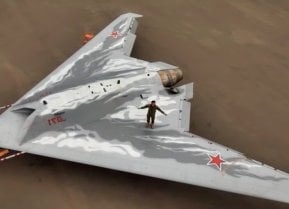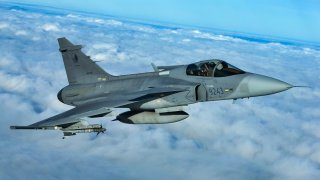JAS 39 Gripen: What Makes This Fighter Jet from Sweden Truly Incredible
To deter Russia in the sky, the JAS 39 Gripen (Griffin) took its first flight in December 1988 and entered operational service with the Swedish Air Force in 1997.
The JAS 39 Gripen is not made in the United States but is a powerful fighter jet built by Saab in Sweden.
While the fighter plane has no household name recognition, she is a force to be reckoned with and is among the very best fourth-generation fighters on the planet today:
With an eye toward deterring Russia in the sky, the JAS 39 Gripen (Griffin) made its first flight in December 1988, and it entered operational service with the Swedish Air Force in 1997.
A total of 204 aircraft in three batches had been ordered by Swedish Air Forces, which to date has taken delivery of 74 aircraft.
The JAS 39 became the first true Swedish multirole combat aircraft – capable of conducting interception, ground-attack, and reconnaissance.
It is presently offered in two modern variants: C- and E-series, yet even those are in need of some updates, and last year it was announced that the Gripen C-series would enter an “upgrade process” that could see those models remain in service until at least 2035.
The Swedish Defence Materiel Administration (FMV) awarded a SEK 500 million ($52 million) contract with Saab to provide maintenance services for the fighter aircraft. Saab will provide capability improvements to the JAS 39 to maintain its operational relevance for the next decade, as well as cost-effective solutions to help sustain the aircraft for an even longer period.
The purpose of the order is to support the comprehensive study undertaken by the Swedish Armed Forces and FMV in 2021.
“We are placing this order to begin work to secure the Swedish Armed Forces’ need for continued high capability and availability for JAS 39 C/D until the mid-2030s,” explained FMV Aviation Equipment head Ingela Mathiasson.
The new contract is for initial work, which will be followed by other additional orders on an ongoing basis.
“Gripen C/D is the backbone of the Swedish Armed Forces today and will continue to be for many years to come, so this is an important order where we will ensure the continued operation and operational relevance of Gripen C/D,” added Jonas Hjelm, head of Saab’s Aeronautics business area said in 2002.
In December 2021, FMV awarded a contract to Saab to deliver the new Gripen E, the advanced variant of the Gripen C/D aircraft.
New Launch System
As part of the upgrade, the aircraft will also receive a new launch system for its air-to-air missiles and countermeasure pods.
That work will be completed from a previously awarded SEK 400 million ($40.6 million) contract from the Swedish government.
The new launcher will reportedly be equipped on both the C- and E-Series Gripens, and it is compatible will all types of missiles the aircraft currently employs, including the AIM-9 Sidewinder and the AIM-120 AMRAAM.
History of the JAS 39 Gripen
The Gripen was initially designed to replace the variants of the Cold War Saab 35 and Saab 37 combat aircraft, built at the time when concerns about Soviet military might were very much on Sweden’s mind. Development of the aircraft began in the late 1970s as part of a joint effort by an industrial consortium that consisted of Saab, Saab Microwave Systems (formerly Ericsson), Volvo Aero Corporation, Saab Avitronics and FFV Aerotech.
The government in Stockholm sought an aircraft that could be capable of fighter, attack, and recon missions. After evaluating a number of existing foreign aircraft including the American F-16 and F-18 fighters, the Swedish Parliament decided in June 1982 to move forward with the Swedish project.
The resulting JAS 39 Gripen is a Mach 2 delta wing and canard fighter jet powered by a Volvo turbofan engine with an afterburner. It has a range of up to 3,200 km (2,000 miles) and can fly at an altitude of 15,240 meters (50,000 feet).
About the Author
Peter Suciu is a Michigan-based writer who has contributed to more than four dozen magazines, newspapers and websites. He regularly writes about military hardware, and is the author of several books on military headgear including A Gallery of Military Headdress, which is available on Amazon.com. Peter is also a Contributing Writer for Forbes.


